
Public data is a fundamental asset for economic development and the improvement of transparency and public services. This is one of the main conclusions of Aporta Meeting 2018, which took place on November 28, at the Secretariat of State for Digital Progress.
More than 300 people were able to follow the Meeting, organized jointly by the Ministry of Economy and Business, the Ministry of Territorial Policy and Public Function, and the public entity Red.es. This year's motto was "Innovation with public data".
The day was structured around three round tables, where public bodies, startups and consolidated companies analysed the keys to success and the challenges of innovation related to public data and new technological paradigms. The Secretary of State for Digital Progress, Francisco Polo, and the Secretary of State for Public Function, José Antonio Benedicto, were in charge of the meeting opening, while the General Director of Red.es, David Cierco, and the General Secretary of Digital Administration, Fernando de Pablo, closed the event.
Open Data, a fundamental asset for economy development
The Secretary of State for Public Function, José Antonio Benedicto, highlighted Spain's commitment to Open Data, as one of the foundations of transparency, innovation and economic development. In this regard, he advanced the next plans of the Ministry, such as the application of Law 39/2015, which will facilitate electronic notification and a single registry. He also highlighted "the development of the Transparency Law and the implementation of 4º Open Government Plan". The objective of all these initiatives is to provide new and better services to citizens through a more digital and innovative administration.
For his part, the Secretary of State for Digital Progress, Francisco Polo, highlighted the role of public data to achieve a fairer society, and to drive the economy. As indicated, "the infomediary sector employs 13,000 people in Spain and accounts for 2% of GDP at European level, but its contribution could double in 2020". Francisco Polo also highlighted the good work done by Spain to promote open data. This work has led us to occupy the first positions of the international indexes (such as the recent second place in the European Open Data Maturity Landscaping).
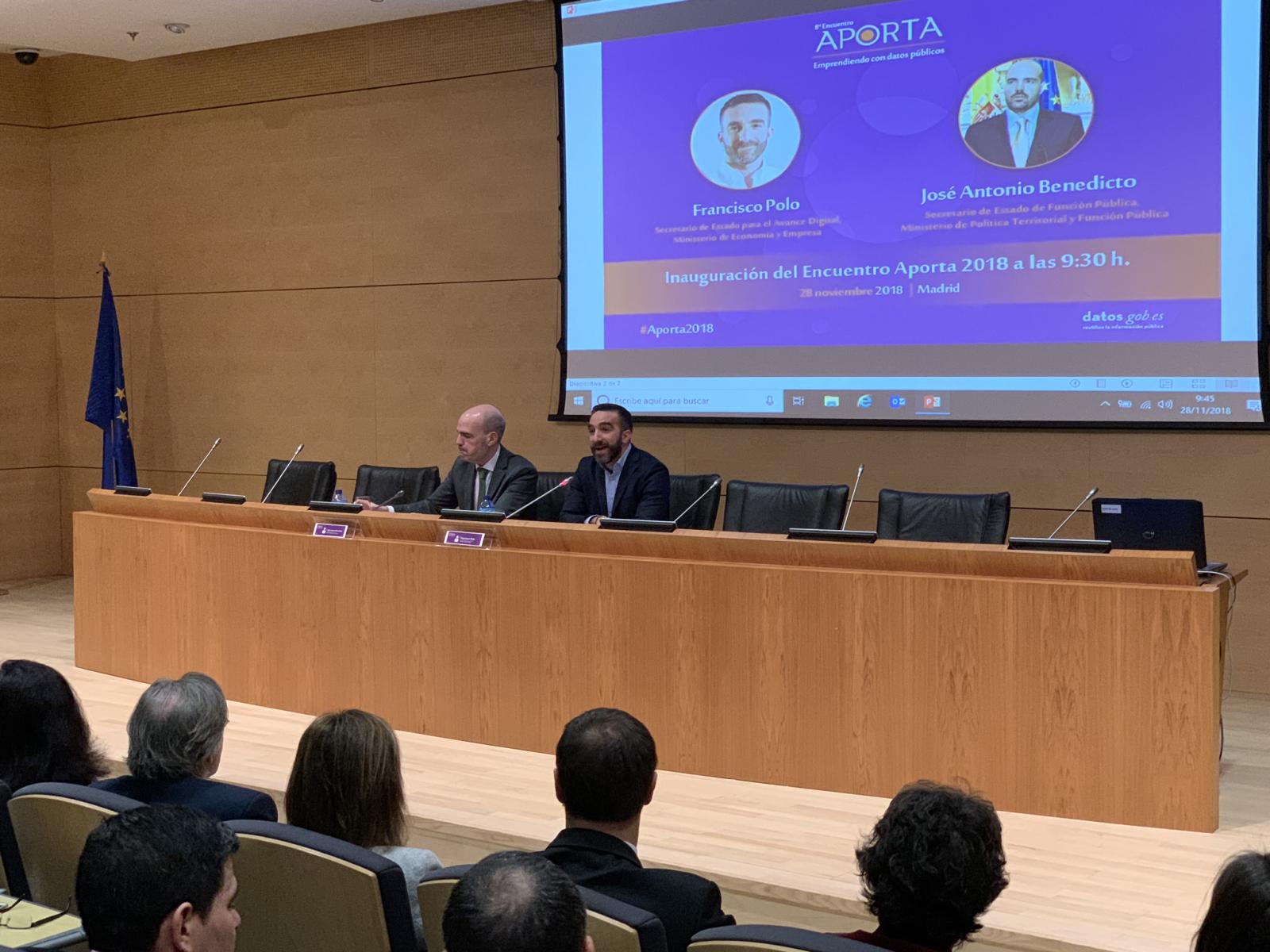

Public Administration as a public data reuser
After the opening, the first round table was focused on the role of public administrations not only as data publishers, but also as reusers, highlighting the role of open data as a tool to improve agility and optimize public services.
The round table was attended by representatives of the different levels of the administration, who highlighted their commitment to transparency and the opening of public information. Among other issues, the speakers analyzed how open data policies have evolved since their inception.
Enrique Ujaldón, General Secretary of the Ministry of Transparency, Participation and Spokesperson of the Autonomous Community of the Region of Murcia, stressed the importance of political leadership to progress in open data programs, highlighting "the obligation to make the data available to society in order to empower civil society", while José Luis Sanchidrián, Head of ICT projects at Renfe, took the opportunity to announce his new open data portal, which will be launched in the coming weeks.
In addition, different examples of public projects for the reuse of public data were discussed, such as the use of IoT technologies to optimize container management in Vizcaya. Laura Preciado, Technical Adviser of the General Directorate of Rural Development, Innovation and Forestry Policy of the Ministry of Agriculture, Fisheries and Food commented on how the markets are analyzed in order to detect possible variations in the prices of fruit to make decisions in the precise moment. "These internal examples help to convince data managers to continue opening public information", commented Antonio Ibáñez, Corporate Web Service Manager of Junta Castilla y León.
Some of the challenges that administrations are facing were also analysed, such as the standardization and homogenization of information, or the incorporation of profiles with analytical, technical and social skills. "It is important to train in BI, but also take into account soft skills that allow thinking outside the box" highlighted Leyre Vitorica, General Director of Government and Transparency, of Provincial Council of Vizcaya.
Other topics analyzed during the round table were the benefits of a data office and the importance of involving citizens to know their needs.
New businesses based on open data
The second round table was integrated by women entrepreneurs who are developing new products and services based on the reuse and analysis of public data. Lourdes Muñoz, Co-founder of Barcelona Open Data Initiative, moderated the debate.
Mercedes Iborra, Co-founder of VisualNACert, told how her company helps to improve the management of agricultural farms in a sustainable way, combining public and private data. "Public data is essential, but you have to complete it with private data, treat them and send the result daily to the farmer" she said.
Piperlab, on the other hand, uses big data and data science technologies to develop algorithms that help predict future behaviors, such as the pollution level of a city like Madrid. Maite Gilarranz, co-founder of the company, took the opportunity to convey a request: "It would be a good idea to make more microeconomic data available to companies and citizens at regional level. It could allow the creation of more specific products".
Another example was Naru Intelligence, which applies data analytics to biomedical sector. Eider Sánchez, Co-founder and CEO, highlighted the needs of collaboration between different profiles and highlighted "dathatons as a key piece to share data and ideas around multidisciplinary teams to find the best solution".
Finally, Flora Fosset, a journalist specialized in data design and visualization, commented on her Project "Soy de temporada", aimed at supporting responsible consumption through information on cultivation and collection period of different fruits and vegetables.
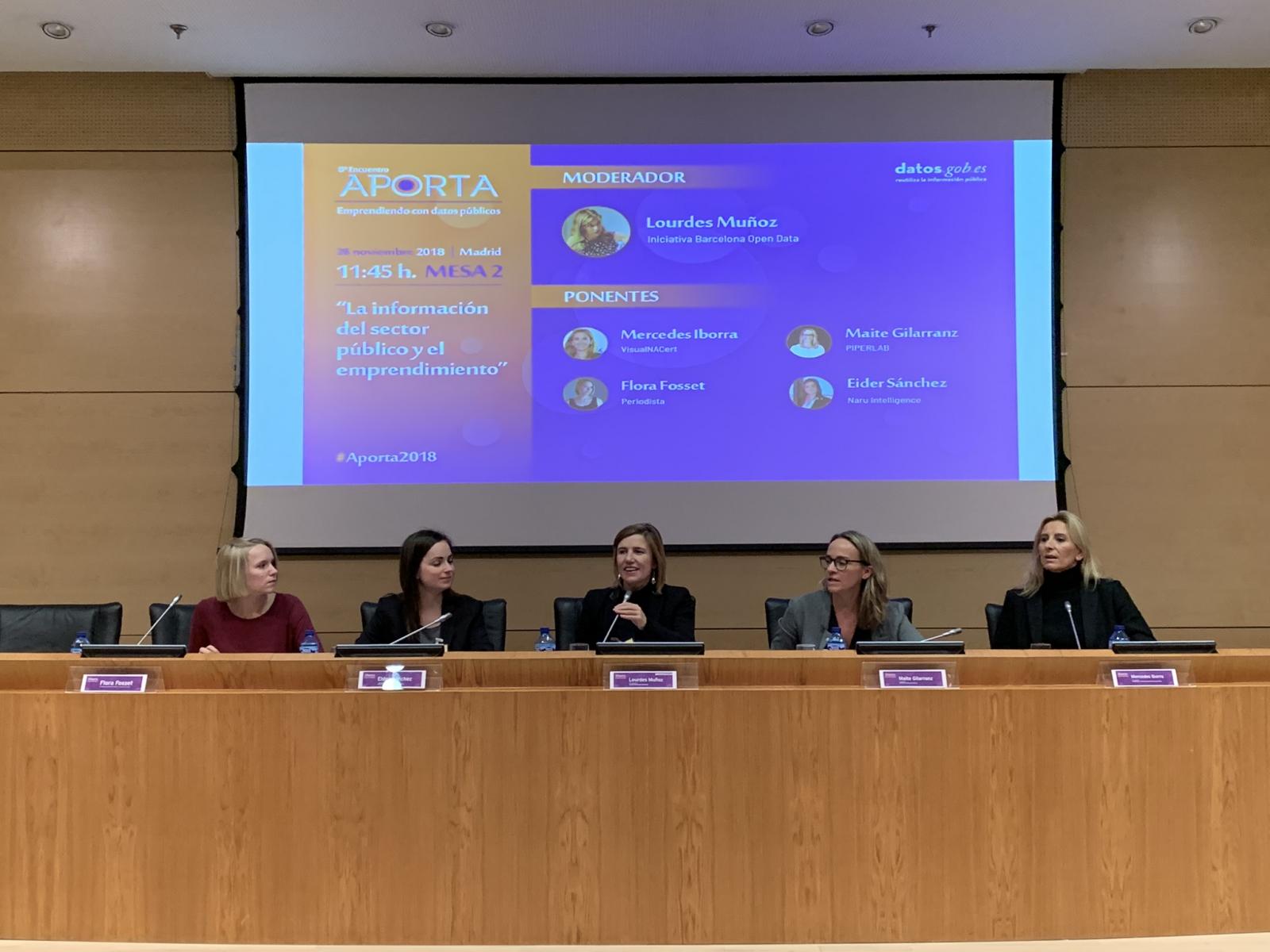
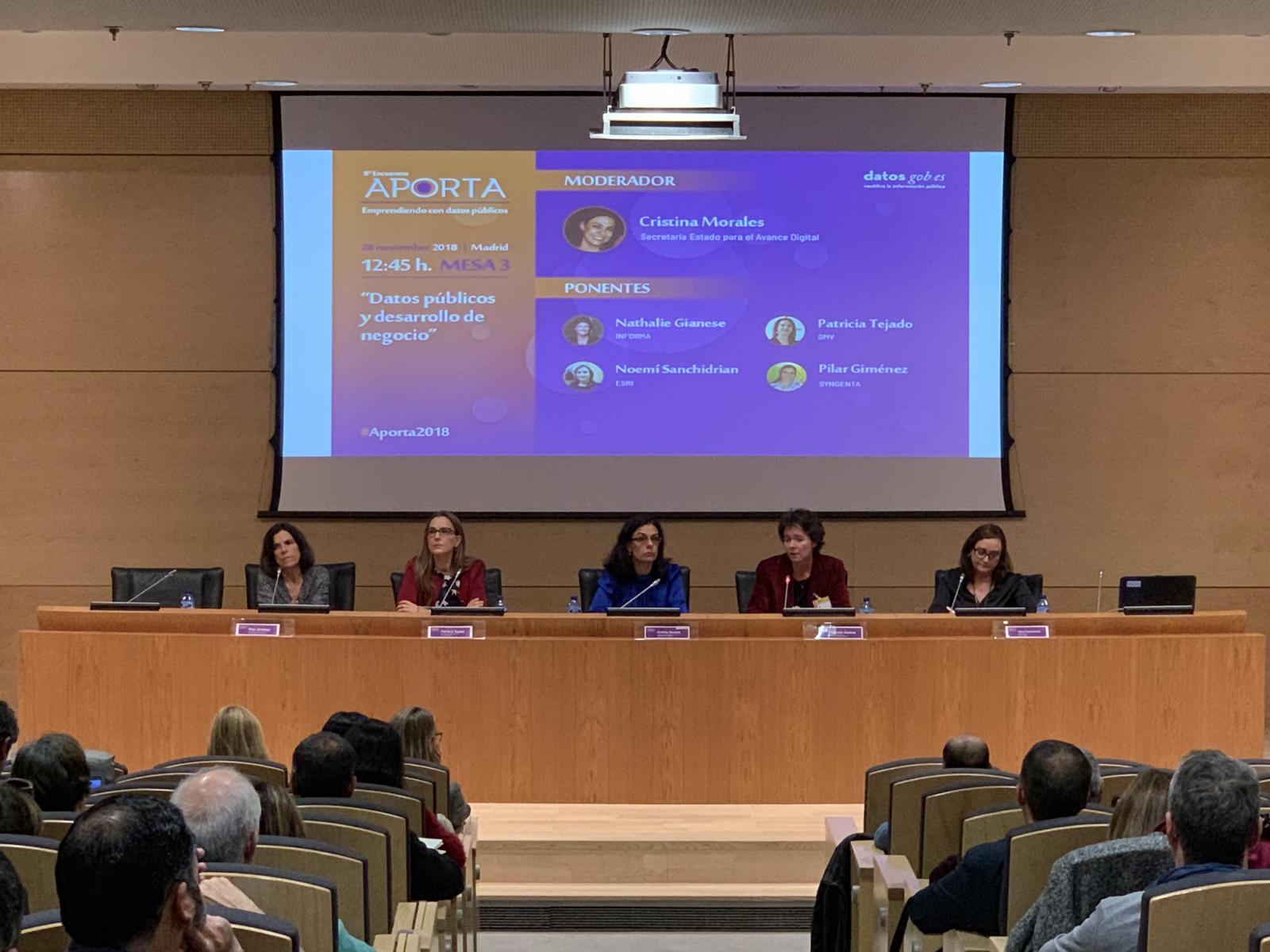
Optimize a successful business using open data
The last round table was moderated by Cristina Morales, Deputy Director for Content of the Information Society, and was made up of international companies that use public data to improve their services.
Noemí Sanchidrian, Commercial Director of ESRI, a company specialized in Geographic Information Systems, commented how the law that boost geographic data opening was fundamental for the company, because it allowed having a base map to reference other data. Sanchidrián also commented that "the responsibility of opening data is not only for the administration, it is shared by the public and private sectors", so it is essential to promote new collaboration formulas.
Nathalie Gianese, Quality and Studies manager at INFORMA, pointed out how INFORMA help companies to better understand their market and fight against fraud thanks to public data. One of their main challenges is the diversity of information from different sources, but Gianese believes that "the Revision of the Directive can provide some homogenization."
For its part, Patricia Tejado, Director of Digital Public Services of GMV, commented on some of the projects carried out in different sectors such as health and agriculture, highlighting the value of the Copernicus project as a data source, while Pilar Giménez, Head of Corporate & Regulatory Affairs Iberia of SYNGENTA, defended that "private data should also be exposed as open data to increase its value".
Aporta initiative as a driver of open data ecosystem
The event was closed by the General Director of Red.es, David Cierco and the General Secretary of Digital Administration, Fernando de Pablo.
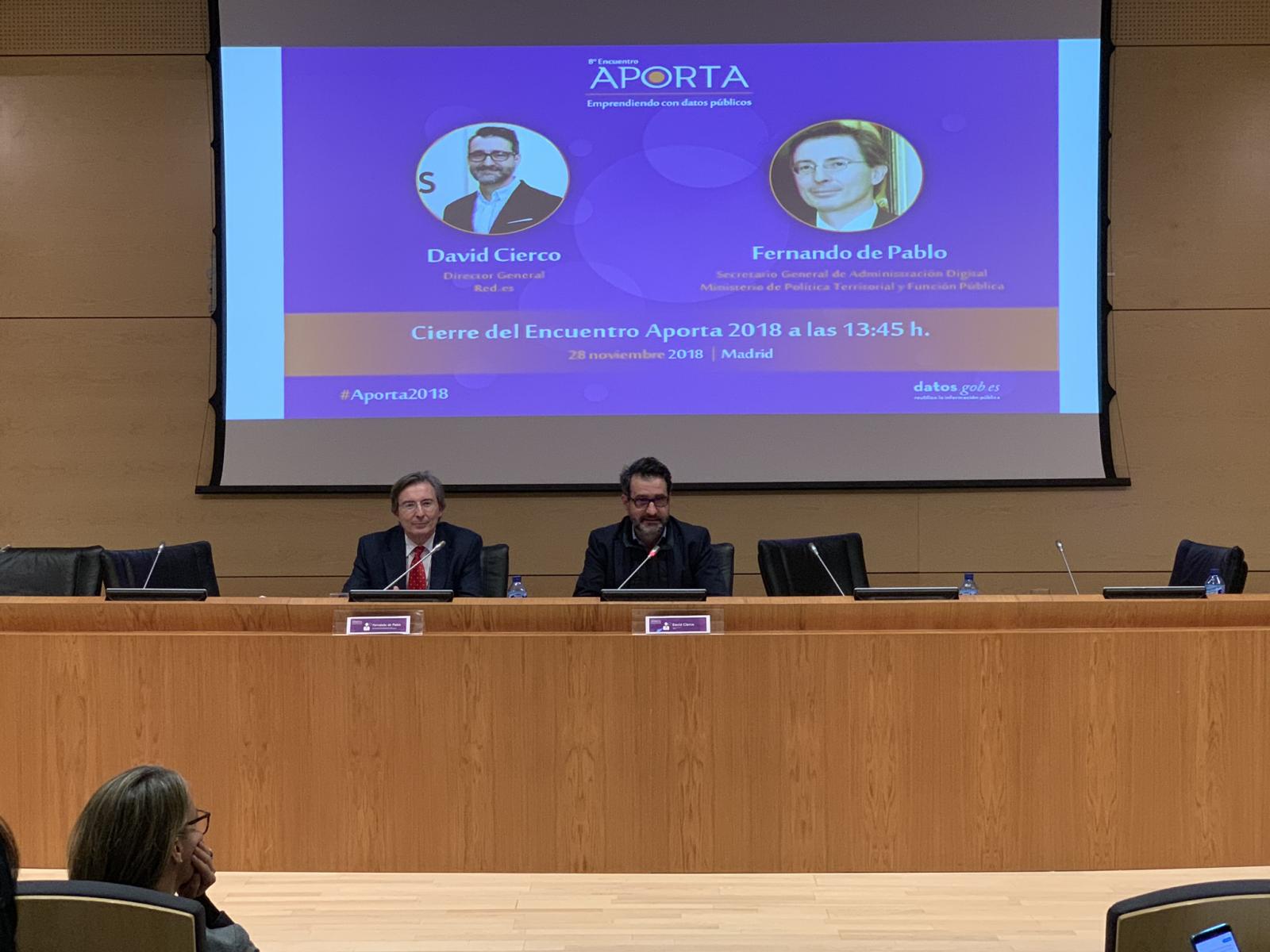
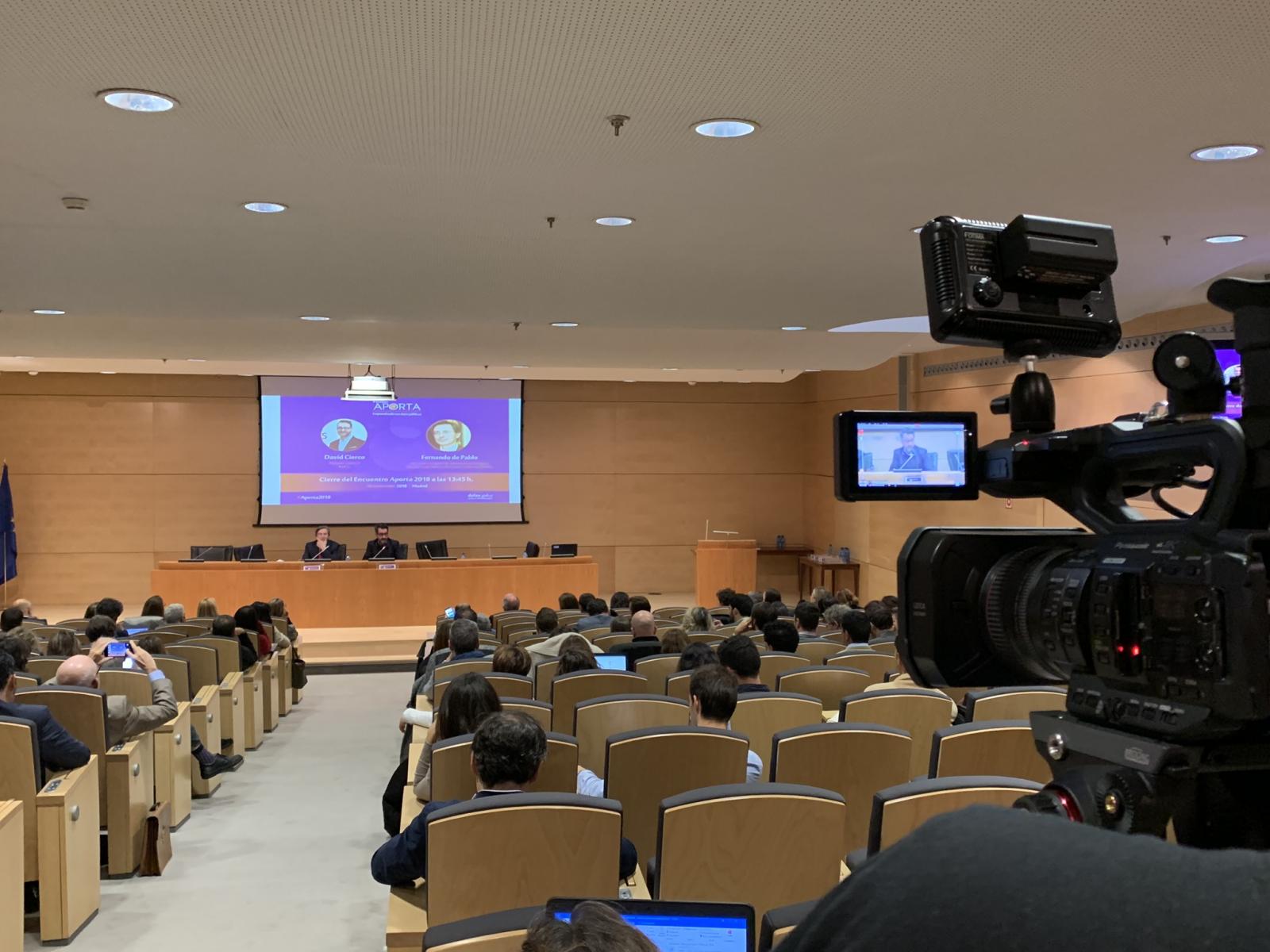
David Cierco highlighted how the Administration should drive data as "raw material to promote an ecosystem oriented to entrepreneurship and innovation". This is the objective of Aporta Initiative, which currently offers more than 21,000 data sets. The future plans of the entity include to ensure the correct implementation of the new regulations, as well as to give visibility to new business models, supporting small and medium enterprises.
Fernando de Pablo, listed the next challenges in the field of open data, such as strengthening the quality of information, the value of data use, and the ethical concerns around the use of data, something fundamental with the irruption of artificial intelligence in public administrations. In addition, he stressed that "the success of open data initiatives in Spain are the result of a close collaboration between the stakeholders, a general policy at country level, and a cultural change".
After these words, Aporta Meeting 2018 ended, and the attendees were invited to meet again in the next edition, which will surely be marked by new advances in the area of open data.